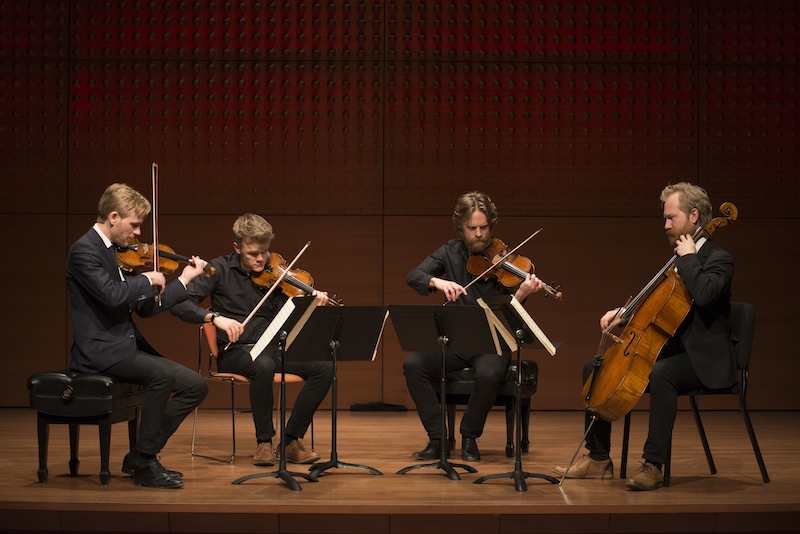Danish String Quartet closes CMS Beethoven cycle with revelatory simplicity

The Danish String Quartet performed Sunday at Alice Tully Hall in the final program of the Chamber Music Society of Lincoln Center’s Beethoven cycle. Photo: Tristan Cook
There is more classical music in existence than any listener could hear in a lifetime. The big names, the great composers, dominate attention, and as much as their work deserves that, the constant presence of the same figures on concert programs—Bach, Mozart, Brahms, et al—can be come predictable.
Then one gets to the late Beethoven string quartets, and nothing is predictable or humdrum. The music is so mysterious and compelling, so wonderful to hear and so consistently interesting that they sound fresher and more adventurous than most works that have followed.
Sunday in Alice Tully Hall, for the final concert of the Chamber Music Society of Lincoln Center’s Beethoven cycle, the Danish String Quartet explored some of these late works: the Op. 131 and Op. 135 quartets and the alternate Allegro finale to Op. 130.
As in previous concerts in this cycle, the event was the meeting between great music and a superb ensemble. The Danish String Quartet has been a popular and critical favorite at Chamber Music Society concerts the past few seasons, and their performance Sunday made clear why. They play at the highest artistic and technical level, and they play with a thought-through approach to what they find in the music and how they feel it should sound.
The program was in chronological order of the compositions with the Quartet in C-sharp minor, Op. 131, the only piece on the first half. At approximately 40 minutes, that half passed in a sense of quick suspension, a tumult of ideas and reveries caught in the stillness between breaths.
From the opening few bars, the specialness of the performance was clear; the Danish quartet’s sound was gorgeous, and their attention to the expressive riches of dynamics and phrasing was ravishing. They played the music with as beautiful a sound and shape as they could give it, yet with a self-effacing simplicity—it seemed like Beethoven was playing them.
Some quartets play Beethoven with just an emphasis on making a beautiful sound, others play the music with a focus on psychological intensity and physical aggression. The Danish group played the music with a feeling of lightness. There was nothing insubstantial about their approach—they gave each other air and space, which let through both the substance of the music and their soft, woolen instrumental color.
They also played with an agility akin to a great athlete who makes the difficult look graceful and efficient. The unique energy that Beethoven coiled inside his rhythms—especially in the Vivace movement of the Quartet in F major, Op.135 —released like a stone skipping across water, picking up speed and energy as it went. Few quartets manage to keep such a lithe and perfectly ordered pulse going underneath the violin syncopation as the Danes did. Their playing for the entire Op. 135 Quartet had extraordinary balance and clarity.
The concert closed with the finale to the Op. 130 Quartet in B flat major (written as an alternate to the Grosse Fugue, the original final movement). Coming at the end of the concert, this Allegro felt like a substantial encore. Graceful as in the rest of the concert, the tempo had an easy quickness to it, with wit and vivacious energy.
The performances throughout the evening offered a rare instance of musicians delivering the quality of the sublime that is in Beethoven’s late music. Deaf and increasingly ill, the music is both wildly mercurial and organically logical. Thoughts seem to come and go at random, until there is a moment that brings everything together.
The Danish String Quartet captured this in an ideal and revelatory way—the profound intellectual and emotional intensity of Beethoven conveyed in a vessel of beautiful simplicity.
At the next Chamber Music Society of Lincoln Center concert, pianist Anne-Marie McDermott plays Haydn Sonatas 7:30 p.m. Thursday, February 25 in the Rose Studio. chambermusicsociety.org